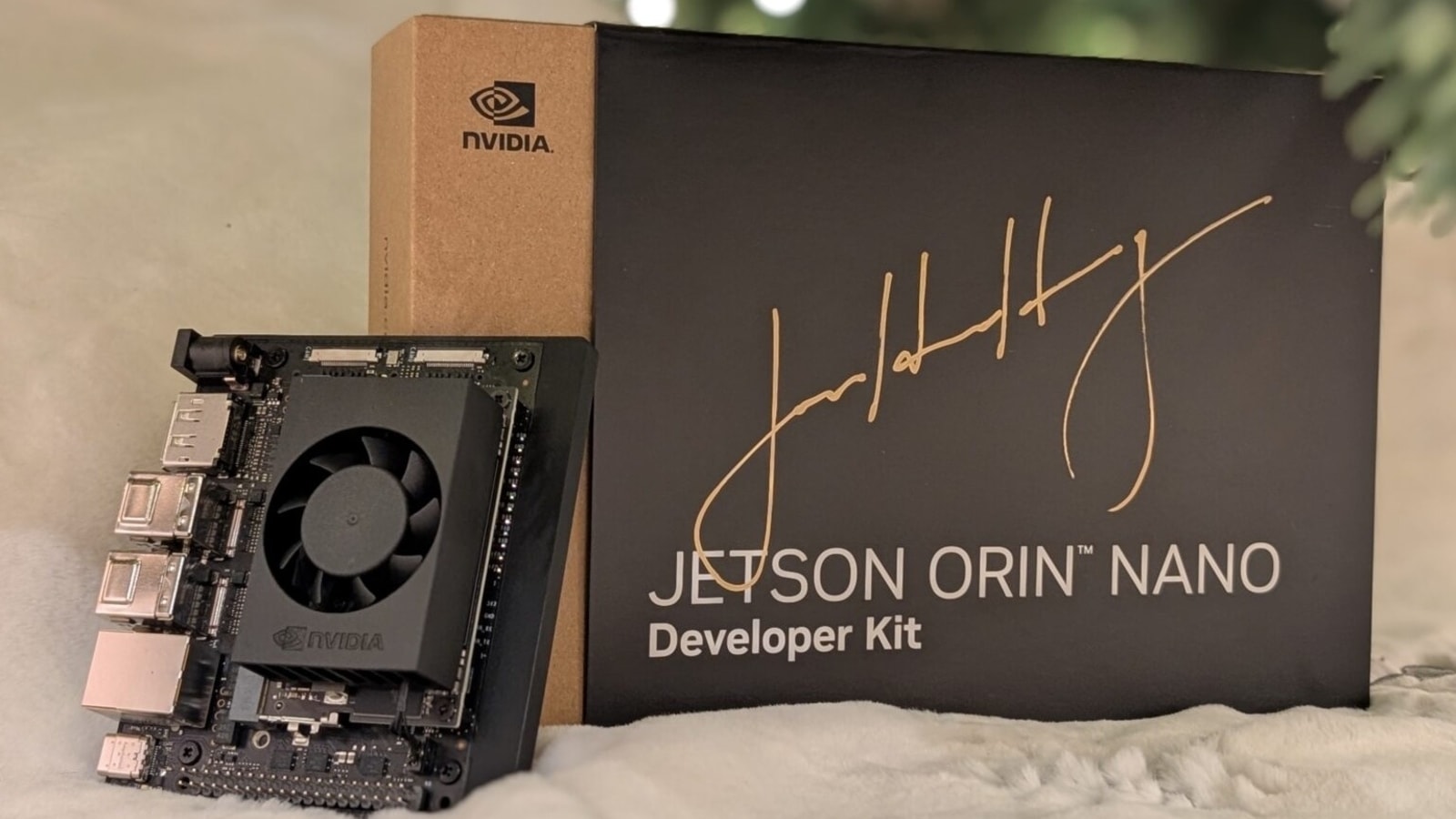Get ready to welcome home the fastest supercomputer yet, that can fit in the palm of your hand. NVIDIA’s latest Jetson Orin Nano Super is the newest System on Module (SoM) built and marketed for AI and edge computing applications. It measures just about 70mm x 45 mm (Smaller than a credit card) and is like the earlier Jetson modules but packs a punch delivering up to 67 TOPS. This is aimed at hobbyists, developers and students looking for an affordable, compact supercomputer for their projects. There are various applications in remote field work, drones, robotics, IoT devices and automation. Nvidia calls it the perfect entry-level option to add advanced AI to embedded products.
Nvidia, known for its multi-threaded parallel processing architecture, recently unveiled its most affordable Jetson series supercomputer at $249, a significant drop from the $499 price point of the previous generation. Jetson Orin Nano Super uses Nvidia’s Ampere architecture and has a 6-core ARM CPU, 1024 CUDA cores with 32 tensor cores. In all, Nvidia is offering 70% increased performance, 50% increase in memory bandwidth over its predecessor to 102GB/s at half the price. This allows for computational tasks like real-time object detection, light-weight Generative AI processing and voice synthesis.
Nvidia also unveiled Jetpack updates for its existing boards, which promises a performance boost of up to 70%. It can also support up to four cameras with higher resolution and frame rates than the previous versions. The excitement behind this release from Nvidia is understandable considering this would be the first time many applications can practically be carried out for the first time without being connected to the cloud/internet which dramatically increases its use-cases.
This has power settings of 7/15/25 watt and for maximum performance you must run it at 25w. The system can be powered by either a USB-C or a proprietary barrel connector. The Jetson Orin has a 40-pin expansion header. According to Nvidia, the new Jetson Orin Nano Super sees a 1.37x to 1.63x boost in Large Language Model (LLM) performance, a 1.36 to 2.04x boost in vision models, and a 1.43 to 1.69x jump in vision transformers.
Hardware optimized for AI like the Jetson Orin nano super are so much in demand currently that they are sold out in many markets and currently on backorder. AI specific chips with GPUs & NPUs are built for parallel processing, executing numerous calculations simultaneously. Generative AI has become an elephant gobbling up all kinds of resources – electricity, AI chips, data centers etc. and the semiconductor industry is struggling to keep up.
The market offers a host of different competitors to Nvidia, the most common of which is the Raspberry Pi. The Coral Dev Board by Google and Qualcomm Robotics RB5 Development Kit are some worthy competitors. The most attractive feature of using a Nvidia Developer board though is the robust ecosystem support and active developer community. Nvidia’s Jetpack Software development kit has a comprehensive set of tools to optimize AI workloads – Nvidia Isaac for robotics, Nvidia metropolis for vision AI, Nvidia Omniverse replicator for synthetic data generation. Nvidia is committed to open-source frameworks – means models like Llama and Gemma 2 can be used without issues on the Jetson Orin Nano Super. The Nvidia Jetson AI lab offers support for these open-source models and provides tutorials for implementation.
The rise of the powerful AI chips like many new technologies, has democratized robotics, automation & IoT and has enabled many to experiment with DIY projects and implement the same for household & industrial projects. The day is not far off when complex AI applications will be a plug & play feature available for you to customize your household projects. And it may remain just that considering full production scale deployment may require additional equipment & resources. The chip would likely remain the most useful though, for academic, educational & prototyping purposes.
For instance, I have a simple idea to track vehicle movement using video footage from a dashcam or CCTV. While this may seem complex and expensive, a DIY prototype can be built affordably using the Jetson Orin Nano Super. This compact yet powerful board supports real-time object detection and tracking with deep learning models. With 67 TOPS of AI performance, it processes live video feeds from USB, IP, or MIPI CSI cameras, identifying and tracking vehicles efficiently. By leveraging NVIDIA’s JetPack SDK and DeepStream framework, it enables edge AI computing without relying on cloud connectivity. This makes it ideal for traffic monitoring, fleet management, or security applications.
In India, it’s available through RP Tech, Arrow and TannaTechBiz for around INR 25,000, with an expected wait time of 1–2 months due to strong global demand. The Jetson Orin Nano Super is a great pick for developers, students, and makers looking to explore innovative AI projects without breaking the bank.





